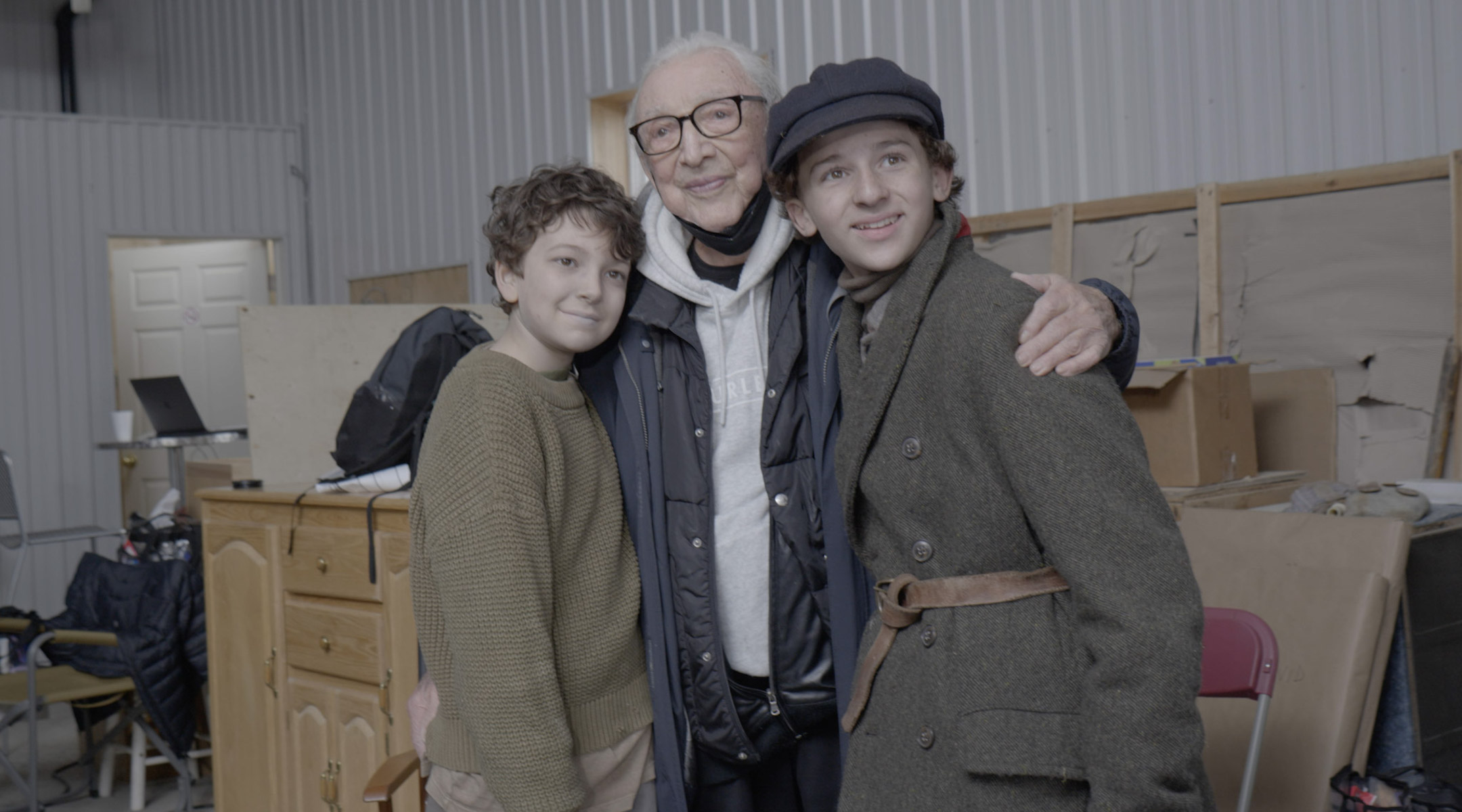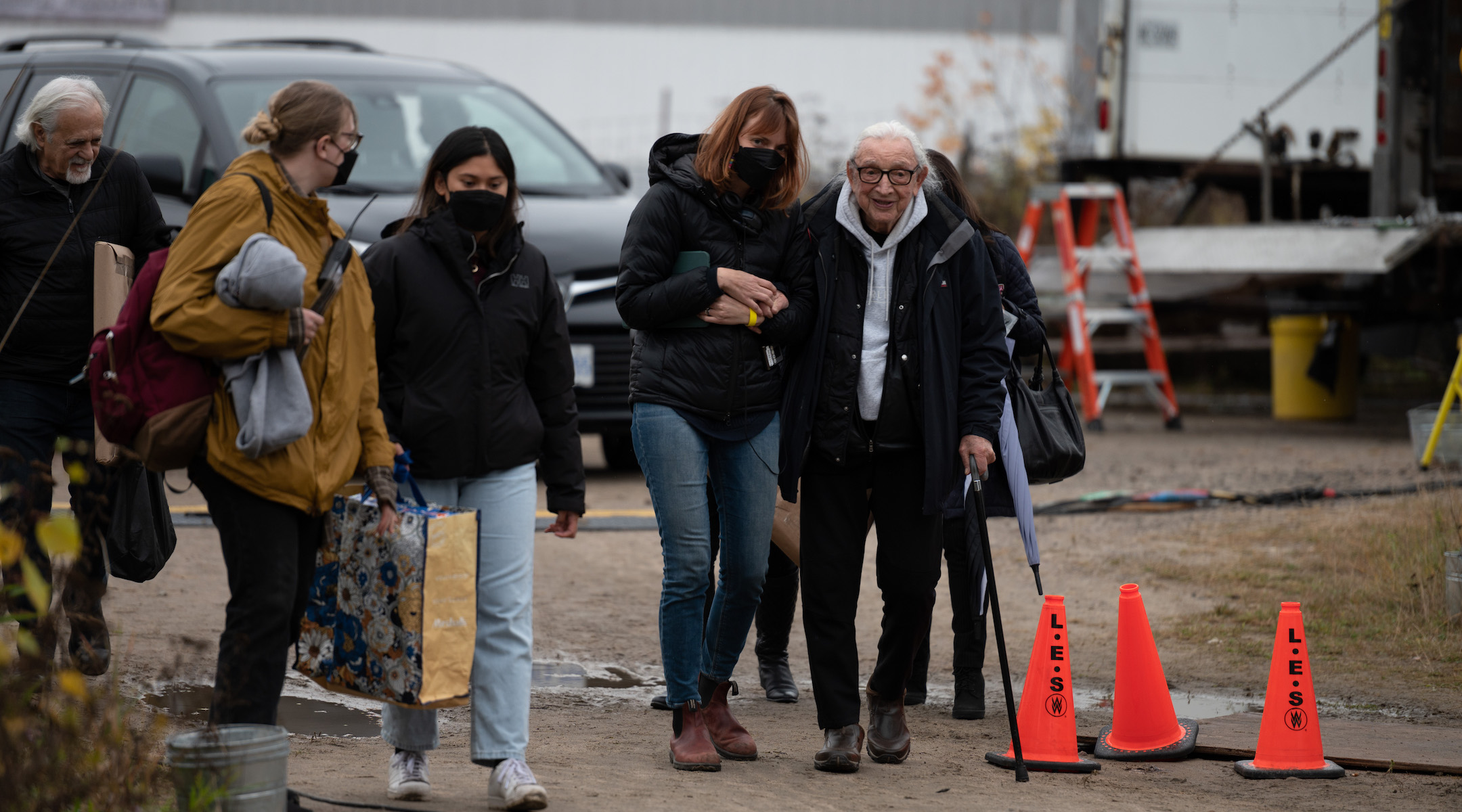In a 30-year career on stage and screen, British actor Richard Armitage is perhaps best known for playing characters from myth and fantasy, including Sir Guy of Gisbourne in the BBC’s “Robin Hood” and Thorin Oakenshield, the head dwarf in Peter Jackson’s trilogy “The Hobbit.”
Now, in “The Boy in the Woods,” the 53-year-old actor plays a real-life hero: Jasko Rudnicki, a Polish farmer and Holocaust hero who helped hide a Jewish boy from the Nazis during World War II.
The feature film which will screen in New York City on Sunday and begin streaming on Apple TV+ on Sept. 24, is based on a memoir of the same name by Holocaust survivor Maxwell Smart, who arrived in Canada as a refugee at 17 and worked as a painter.
“I’m always drawn to a story where the first thing you know about it is that it’s based on a true story, but also a living person’s memoir,” Armitage told the New York Jewish Week in a phone interview. “Of course, when that memoir is rooted in a subject like Holocaust, and what we know about it and what we don’t know about it, I immediately think this is such sensitive material — it’s precious.”
“The Boy in the Woods” premiered at the Toronto International Film Festival in 2023. On Sunday, three key individuals behind the film’s creation will participate in a talkback at the Center for Jewish History near Union Square: Armitage, director Rebecca Snow and Smart, the Jewish boy who survived in the woods all those years ago.
It will be the first time that Armitage and Smart, who is 94 and lives in Montreal, will meet face-to-face.
“I can’t wait to talk to [Smart], because Jasko is the one person that Max was never able to track down after he left Poland,” Armitage said. “Hopefully with the release of this film, somebody somewhere might see it and say, ‘That was my great-grandfather, or that was my grandfather.’”
Growing up in Nazi-occupied Poland, Smart, who was born Oziac Fromm, was 12 when he escaped the Buczacz Ghetto in the spring of 1943 as it was being liquidated by the Nazis. Smart fled to his aunt’s house, who Smart said had been spared until that point because she owned a chocolate factory the Nazis were fond of. She arranged for Smart to stay with Rudnicki, the farmer, whom she paid to hide him.
When Smart’s presence proved too dangerous for Rudnicki and his family, Rudnicki taught the boy some survival skills and sent him off to hide in a forest for more than a year. There, he befriended another hideaway, a boy around his age named Janek.
While Smart survived, Janek did not. In the winter of 1944, the two boys heard a seemingly abandoned infant crying in the forest; Janek crossed a freezing river to collect the child. He became sick and died a few days later. Incredibly, Smart managed to save the baby’s life, eventually reuniting her with family members who were also hiding in the forest.

L-R: David Kohlsmith, Maxwell Smart and Jett Klyne on set. Kohlsmith and Klyne play Janek and a young Max, two boys who meet hiding out in a forest in Poland during the Holocaust, in “The Boy in the Woods.” (Photon Films)
It took 70 years for Smart to share his story. “It’s not that I didn’t want to talk about it, but it was not very popular to be a refugee and a Holocaust survivor,” Smart told the New York Jewish Week in a Zoom interview from his Montreal home, sitting next to his wife Tina. “In reality, nobody was interested.
“Now, everybody is waking up to it, because antisemitism is flourishing and the people want to know what happened,” he continued. “So I opened up.”
Smart’s bestselling memoir, “The Boy in the Woods: A True Story of Survival During the Second World War,” was published in 2022.
Director Snow had met Smart when she was working on “Cheating Hitler: Surviving the Holocaust,” her 2019 documentary about child survivors living in Canada.
“Making that documentary, working with Max, traveling to Israel with him and interviewing him for hours and hours made me realize that his story would be hugely beneficially told in a drama,” Snow, who is not Jewish, told the New York Jewish Week. “The documentary very much felt like just the beginning. The story wouldn’t let go of me — or I couldn’t let go of it — and I felt like it needed to be a drama.”
Snow secured a grant from the Claims Conference to support making the story into a drama. In making the film “The Boy in the Woods,” Snow said she was inspired by the opportunity to tell a personal story from the Holocaust, telling “an incredible survival story,” that felt unique to her.
“It’s a Holocaust story that people haven’t seen before,” Snow said. “It’s not about camps, it’s not about hiding in cupboards or secret rooms. It’s really about two boys in this incredible environment that is both very dangerous, but also a refuge.”
She added: “The fact that this was a young artist, too, whose creative mind is being formed throughout all of this trauma that he’s experiencing in this very mythological place in the woods, was really fascinating to me.”

Rebecca Snow and Maxwell Smart arm-in-arm on the set of “The Boy in the Woods.” (Photon Films)
For Armitage, working on the film was “a real lesson in perspective” — something he hopes that audiences will benefit from as well.
“Max is one of the most altruistic people,” he said. “He did survive, and he did go on to have this extraordinary life, and is filled with positivity despite what happened to him. He seems to be so full of positive energy. Having brushed past his story like this, no matter what happens to me in my life, when things get a bit tricky or difficult and I want to whine about something, I think about Maxwell Smart, what he went through as a tiny child.”
As for Smart, he said one of his favorite aspects of the film is that it’s able to be shown to children.
“[Snow] produced a movie about the Holocaust that is so powerful and that could be shown to children,” he said. “She took the horror, the murder, the unbelievable happenings, and she produced a soft, nice — and horrible — story about survival. She was able to show how children were victims of the Holocaust.”
“It is very important that this should be shown to young children — they should know really what happened,” he added. “They are the future. They’re our future. They are the future lawyers, the future governments. They should be the first ones to digest what really happened in such a horrible time.”
“The Boy in the Woods” is screening at The Center for Jewish History (15 West 16th St.) with a talkback with Armitage, Smart and Snow on Sunday, Sept. 22 at 7 p.m. Get tickets for $10 here. The film will be available on Apple TV+ starting Tuesday, Sept. 24.
The New York Jewish Week brings you the stories behind the headlines, keeping you connected to Jewish life in New York. Help sustain the reporting you trust by donating today.





